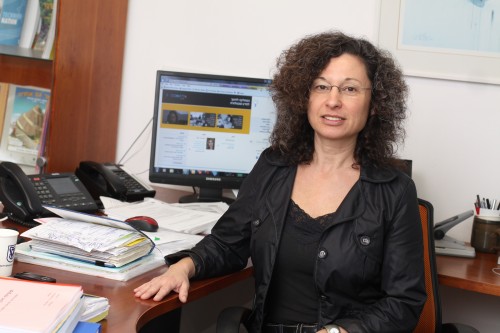Dean of the Faculty Prof. Orit Hazan: "This is not just a semantic change"

The "Mbatim" program led by the faculty brings back hundreds of Technion graduates to complete an additional degree at the Technion: science teaching. Many of them have already integrated as teachers in the education system
The Department of Science and Technology Education at the Technion is now a faculty. Since its establishment about 50 years ago, the unit has steadily grown and expanded its activities, and today it employs 12 faculty members and conducts undergraduate and graduate studies, diverse and high-quality research, as well as the Mbatim program.
The "Views" program, which was born out of the Technion's commitment to the quality of scientific, technological and engineering education in Israel, gives Technion graduates the opportunity for an additional bachelor's degree in teaching mathematics, science or technology. The tuition of the students in the program is fully financed by the Technion, without a requirement for a commitment (on the part of the students) to work in the formal education system.
The transformation of the department into a faculty officially took place on June 28.6.2015, XNUMX. "This change," says the dean of the faculty Prof. Orit Hazan, "expresses the Technion's recognition of the unit as a faculty equal in status to the other faculties, whose contribution to the State of Israel is known worldwide. The activity of the faculty reflects the Technion's social commitment, and its declaration as a faculty has an operative meaning that goes beyond the semantic change. Our goal now is to position our field of expertise - quality science and technology education - as a required profession. The people who choose to work in this field influence the State of Israel and contribute to its economy no less than science and engineering graduates. We perceive education for science and technology as a means that allows every student to use up the variety of their skills."
The official change in the status of the unit was preceded by a recommendation from an international committee for quality assessment (on behalf of the MLAG - the Council for Higher Education). After a thorough examination of the department, the committee recommended that it be turned into a faculty. The recommendation states, among other things, that the unit "is focused on science and technology education and is dedicated to a wide range of issues related to education in the State of Israel... We praise the focus on education for engineering, science and mathematics, which expresses a broad view of the needs of the Israeli economy in general and of the high-tech sector in particular. We were particularly impressed by the Mbatim program, which succeeded in bringing teachers with excellent knowledge of science and mathematics into the field of education."
The chairman of the Technion Alumni Association, Eyal Kaplan, said that "the announcement of a change in the status of the unit is recognition of the Technion's important addition to the primary and secondary education system - both through academic research aimed at improving teaching methods and students' openness to science and technology, and through practical training of educators in the field." While the Technion is known as a university that made a decisive contribution to the image, quality and status of the knowledge-rich industry in Israel, only a few know that a select group of Technion graduates fill the ranks of the scientific-technological education system in the country - from classroom teachers to senior officials in the education system."
on the faculty
The Faculty of Science and Technology Education, as it is now called, is engaged in research in STEM Education (Education for Mathematics, Science, Technology and Engineering) mainly in the context of secondary and academic studies. The faculty trains teachers and administrators in these fields and designs and evaluates programs and innovative study methods. Faculty members are engaged in many diverse fields, including science communication (making science accessible to the public), neuroeducation (identifying brain mechanisms active in learning), learning in industry and encouraging students to choose science and engineering. The research in these fields is done within the framework of collaborations with other Technion faculties, with leading universities in the world (Stanford, Cornell, MIT and others) and with leading companies including Intel, Microsoft and Google.
The Mbatim program, which gives Technion graduates an additional degree (science teaching), has in its four years of existence produced about 150 highly experienced engineers and scientists and is bringing about a significant change in the teaching of practical subjects in many schools. The director of Haifa City Hall, Shlomi Dahan, points out that "the teachers who came from the Mbatim program have made a great contribution to the change in City Hall, which has doubled the number of students studying 5 math and physics units in four years. Today, 32% of the school's students take 5 units in these fields." The mathematical, scientific and engineering knowledge of Technion graduates allows them to be trained for high-quality teaching at the highest level in 5 study unit and 5+ courses.
The faculty took a central part in the development of the Technion's first MOOC course (using the "Coursera" platform), initiated and manages the project "My teacher - a teacher for life" in the framework of which students at the Technion choose the teachers who charted their path and led them to the Technion, and is involved in many significant processes at the Technion and in the education system in Israel
